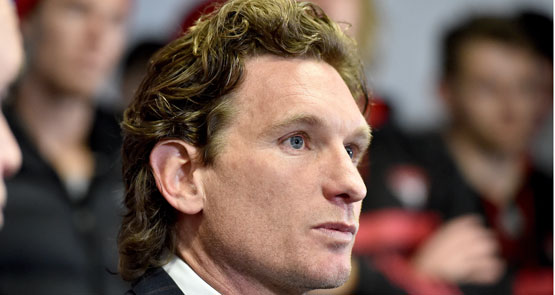
Tarnished AFL legend James Hird will fly to Sydney this weekend to give what he has said will be his first and only major interview on the Essendon sports doping scandal before a live audience at the Ethics Centre.
Fronting up to an event in Sydney means Hird will avoid at least some of the legions of wounded Melbourne-based Essendon supporters in the audience. Still, an interview carried live to an audience promises a measure of unpredictability. It’ll be a small crowd — a spokesperson told Crikey the Ethics Centre, which runs large events like the Festival of Dangerous Ideas at the Sydney Opera House, will only seat 60 in its audience for the 50-minute interview. As Crikey neared deadline, the $33-a-pop tickets were “going fast” but had yet to sell out.
Hird will be speaking to the ABC’s Tracey Holmes, and the Sunday night interview will be carried live to the nation on ABC News 24 and ABC News Radio. Yesterday the club he used to coach had 34 current and former players suspended for a year in the final outcome of the Essendon peptide scandal, which has engulfed the club, and the AFL, for the past three years.
Holmes is perceived as one of the journalists reporting on the saga who is most sympathetic to Hird. He’s spoken to her before, most recently in December as part of a panel on Holmes’ show The Ticket. She was grilled about her views on Hird in a fiery interview on 3AW this morning and said she had “heard those descriptions, many of them coming from Melbourne”. But she insisted “what I’m interested in are the facts”.
Sports journalism greatly blurs the line between reporters and commentators, with most journalists doing both news and opinion articles and TV appearances. It’s a rare AFL reporter whose views about Hird, and his role in the scandal, are not well known. Holmes told 3AW that Hird had been “much maligned by the Melbourne media”.
She referenced an editorial in The Age this morning that stated:
“Former coach James Hird, whom we believe has not been sufficiently disciplined for his role, contends the court’s decision amounts to a miscarriage of justice for the players. Hird needs to recognise that not one minute of this dangerously experimental, legally protracted and emotionally fraught saga would have occurred if he, Hird, had done what was required of a coach, a mentor, a club leader — and that was to refuse to allow fanciful concoctions of supplements and peptides to be injected into any player in his care.”
“[It] again mentioned Hird as the architect of the program … I question what that is based on,” Holmes said, “given that ASADA spoke to James Hird for hours … and James Hird was not issued with an infraction notice. The Court of Arbitration … did not ask to speak to James Hird.”
“Most people seem to have determined he was the person responsible, and I don’t think that those facts have been proven. And these are some of the facts I want to get to on Sunday night.”
She said no subjects were off limits with Hird, who was not vetting questions beforehand. She said it was her understanding, which Crikey confirmed with the Ethics Centre this morning, that Hird was not being paid for the interview. “James has put no stipulation on where I can and cannot go. That’s a PR exercise, and not what I do.” She said while the interview had been in negotiation for some time, it had only been finalised yesterday afternoon.








Will be an interesting interview
James Hird, talking about doping at… the Ethics Centre!
Ha ha ha That’s pure comedy sketch material for The Chaser.
Ummmmm…… Until the players were found guilty of using prohibited substances it would be rather hard to get the alleged organisers, there is nothing to have been organised. Dank is a different case, the paper trail lead directly to his hands, and the Cronulla Sharks fingered him pretty comprehensively to save their own skins.
Now that tne players have been done things might start getting rather interesting for all of the Essendon management team jn place at the time. Hird was suspended for bringing the game into disrepute, not for aiding or organising the supply of a prohibited substance to an athlete. If he’s found guilty of that the mandatory suspension is four years, which will effectively be life as no one in the game or the media will touch him with the proverbial 40 foot pole from that point on.
Rundle has grasped the nettle. I would say let the players free this time only. After all, they are professional business persons. With players drifting between teams like straw in the wind my interest in the sport is diminished.
Tell us, anonymous Stickey, WHY some crooks deserve such special leniency?